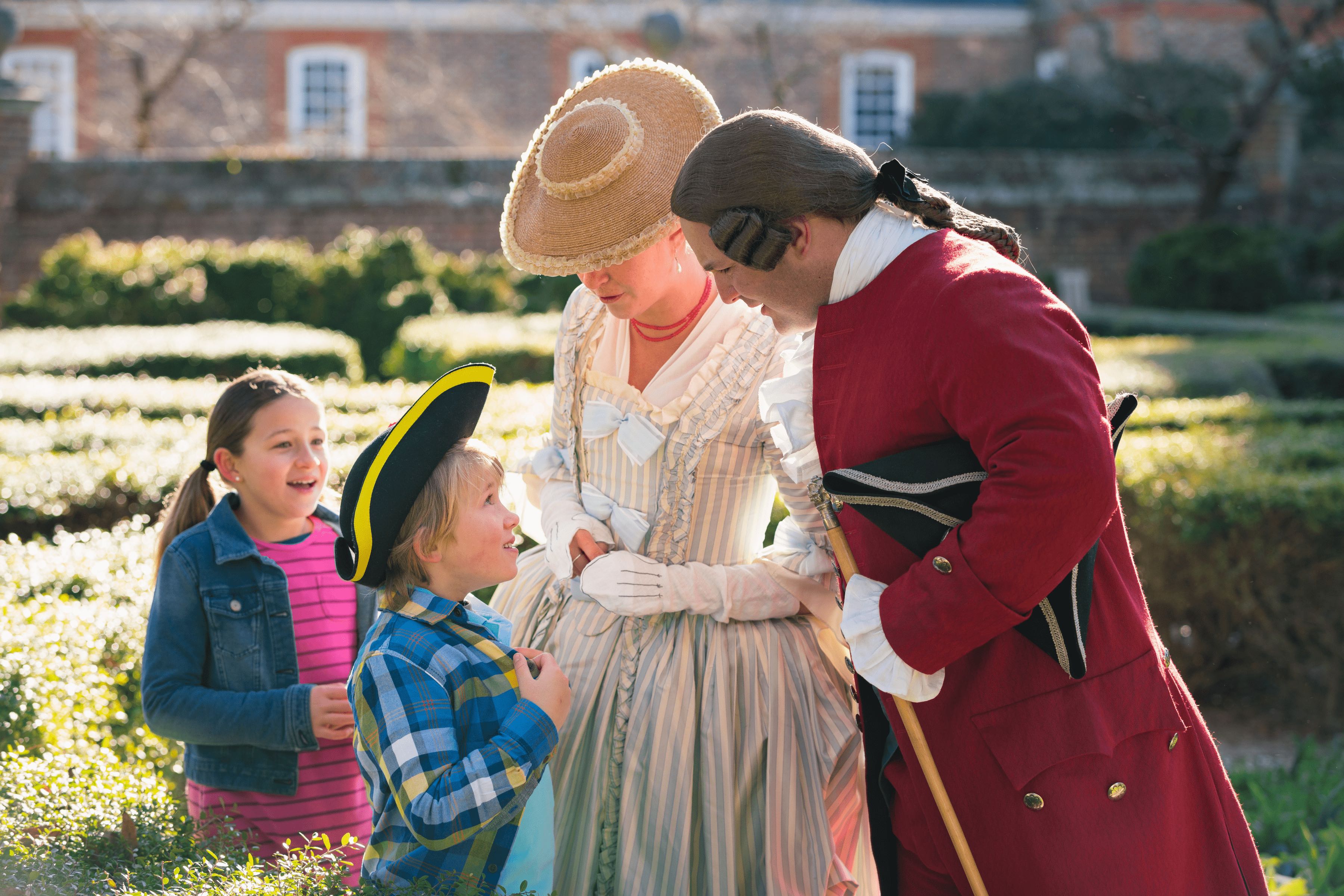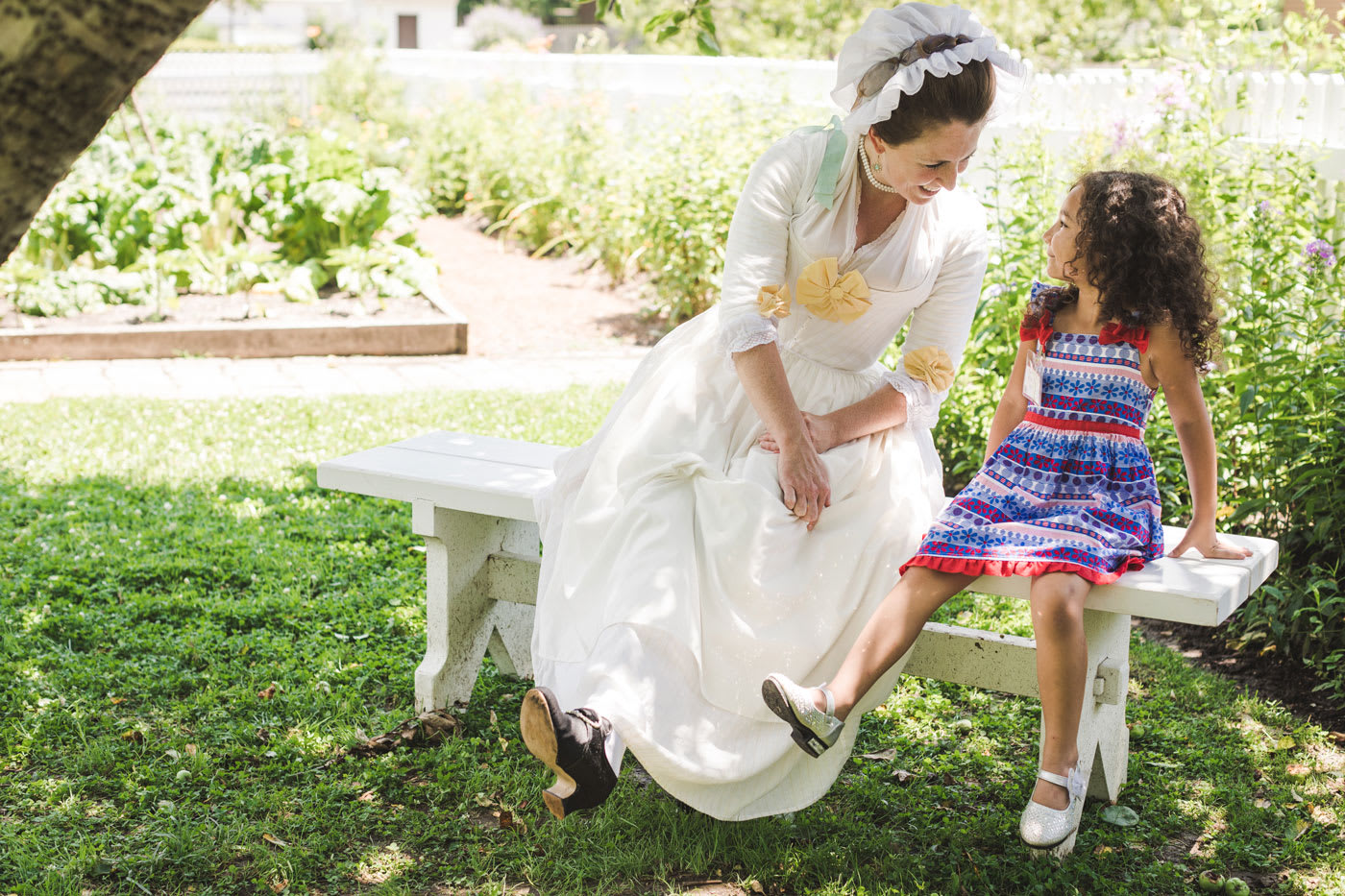When you visit Colonial Williamsburg, the past literally comes to life before your eyes. You can hear blacksmiths working, smell wood fires in the winter, and taste 18th-century chocolate at the coffeehouse. You may even encounter someone from the 18th century who has stepped right out of the past to have a conversation with you. Those of us in the Actor Interpreter department call ourselves many different things: Character Interpreters, First-Person Interpreters, Historical Figures, and People of the Past, but our goal is always to make you feel like you have stepped directly into the past to have a conversation with someone who lived hundreds of years ago. So, what is it like to portray a person from a different time period? Actor Interpreter and Programming Lead, Emily Doherty, has five things you didn’t know about Character interpretation!
1) We have a plan
If you have an encounter with a historical figure you may think that you’ve stumbled into a seemingly random conversation. Perhaps you’re talking to a woman who is the enslaved cook at the Randolph House, or a young mother who’s looking for her wayward son. However, whenever you speak with a person of the past, you should know that we have a topic in mind and an educational goal. This is the “interpreter” part of the title “Actor Interpreter”; it’s our job to take what we know about the past and make it relevant to you. The Colonial Williamsburg Foundation continues to provide its interpretive staff with resources and opportunities to grow, such as certification through the National Association of Interpretation. We want you to walk away with both a unique experience and some knowledge you didn’t have beforehand. The young mother may seem like she’s talking about her son’s lack of discipline, but I bet you leave the interaction knowing a little more about informal education in the 18th century! Of course, you should always ask us questions about the topics that you are interested in, too.

2) We do our Research
At first it seems daunting to step into someone else’s life. As people of the past we need to know about the world they live in, everything from where they buy their groceries to what their opinions are on the Stamp Act. Luckily working in an 18th century town means that there is a city of experts at our fingertips. Need to know about medicine? Ask the apothecary! There are lots of primary sources (written in the period) and secondary sources (written by scholars after the period) that we use to fill in the blanks. The Foundation also operates the John D. Rockefeller Jr. Library, which allows us to access databases as well as books and journals. Of course, we do have historians on staff, and when we’re really stumped they’re a big help! Despite all of this, I find myself saying “I don’t know” fairly often — and that’s ok! It’s always better to admit you don’t know something rather than make it up, and it provides an avenue for further research.
3) We form personal relationships with our characters
It’s almost impossible to walk around in someone’s shoes every day and not become attached to them. Sometimes when I find out new details about my characters it feels like I’m discovering information about my own family. I can tell you as much about Mrs. Henry’s favorite holiday dish (brined turkey) as my own, and occasionally it feels as if these historical figures are tapping us on the shoulder to get us to focus on a particular part of their story. However, we always try to represent our characters honestly; and as much as we might relate to some parts of their lives it’s important to try to keep perspective as historians.

4) Sometimes we have to present opinions we disagree with
There are times when I have to say things in character that as a 21st-century person, I deeply disagree with. For example, two out of the three characters I portray owned slaves, and I have no indication that they eschewed the 18th-century norm of looking at their enslaved people as property, not people. Despite the fact that I may disagree with their opinions, when I become my character it’s my job to accurately represent the world they lived in, warts and all. In order to discuss these difficult topics in first person we have to establish trust with our colleagues. We need to trust that the words that we speak in character will not damage the relationships we build as cast mates, coworkers, and friends. We need to establish that everyone in our ensemble has the opportunity to be honest about the emotional impact of portraying these historical figures. These conversations will never be easy, but representing the past faithfully leads to a more informed future.
5) The 18th century is not as different as you might think
The people we portray loved, hated, laughed, cried, procrastinated, and joked just as we do. There is not a week that goes by without an unexpected connection between the 18th-century and the modern world. It’s sometimes hard to remember, but these people were modern in their own time too — and though their clothes and manners were different from ours, their human experiences were very similar. Have you ever been frustrated that you were unable to get a love interest to notice you? So was a young woman in 18th-century London who wrote to an advice column asking for help. Have you lost a wallet and desperately hoped that someone found it? Luckily for Benjamin Pollard in 1776, a tavern keeper was kind enough to try to return his.
The biggest lesson that I’ve learned as a character interpreter is that no matter the century, people are people. When you encounter us in the street, don’t be afraid to say hi! Ask what our names our are, or how our day is going. We can’t wait to be back in the colonial capital with everyone again soon!

Emily Doherty is a Programming Lead and Actor interpreter and has been with the foundation for nearly six years. She enjoys discussing how women shaped the early American Republic and their role within the legal system. You may encounter her as several different characters, including a tavern keeper, a transported convict, and the first “First Lady” of Virginia.